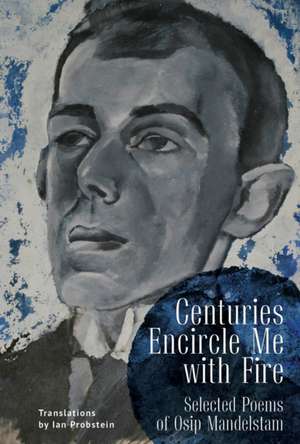Centuries Encircle Me with Fire
Autor Osip Mandelstam Editat de Ian Probsteinen Limba Engleză Paperback – 18 apr 2022
| Toate formatele și edițiile | Preț | Express |
|---|---|---|
| Paperback (1) | 137.95 lei 3-5 săpt. | |
| Academic Studies Press – 18 apr 2022 | 137.95 lei 3-5 săpt. | |
| Hardback (1) | 718.86 lei 6-8 săpt. | |
| Academic Studies Press – 19 apr 2022 | 718.86 lei 6-8 săpt. |
Preț: 137.95 lei
Nou
Puncte Express: 207
Preț estimativ în valută:
26.40€ • 27.51$ • 21.86£
26.40€ • 27.51$ • 21.86£
Carte disponibilă
Livrare economică 13-27 martie
Preluare comenzi: 021 569.72.76
Specificații
ISBN-13: 9781644697177
ISBN-10: 1644697173
Pagini: 304
Dimensiuni: 152 x 229 x 19 mm
Greutate: 0.43 kg
Editura: Academic Studies Press
ISBN-10: 1644697173
Pagini: 304
Dimensiuni: 152 x 229 x 19 mm
Greutate: 0.43 kg
Editura: Academic Studies Press
Notă biografică
Osip Mandelstam (1891-1938) was, together with Anna Akhmatova and her then husband Nikolai Gumilyov, one of the best-known members of the Acmeist school of poetry, which laid emphasis on the architectural quality of poetry and the meaning of the word "as such", in reaction to what they saw as the over-abstraction of Symbolist poetics, then in the ascendancy in Russia. Mandelstam wrote what would become the group's most famous manifesto, The Morning of Acmeism, though it was not published until some years after the group had established itself.His work's admiration for the Classical and European past did not chime well with the Bolsheviks' emphasis on progress and the future. In the 1920s Mandelstam came under increasing pressure from writers and literary administrators more in line with the dominant political tendencies within the Soviet government. The second half of the 1920s saw him largely abandon poetry, in part at least through being told by Politburo member Nikolai Bukharin, later to die himself in Stalin's purges, that his poetry would no longer be published. Mandelstam's prose continued, however, and he supported himself by making literary translations, chiefly from French, as well as writing children's poetry. Throughout this time the anchor in his life was his wife Nadezhda, whom he had married in 1922. She came to play an integral part in his poetry too; she acted as his amanuensis during his lifetime, and would then preserve the unpublished work after his death, in part through memorisation, and enable its publication after the Stalin era, also becoming a noted writer herself with her memoirs of life with Mandelstam and her subsequent odyssey through the Soviet Union. In the 1930s he was sent into internal exile in Voronezh.In 1938, the exile ended, and there followed a nomad existence in small towns around Moscow (from which the poet himself was banned). A state-sponsored stay in a sanatorium allowed the authorities to isolate Mandelstam fully; from this sanatorium he was arrested and transported past the Urals as far as a Gulag transit camp near Vladivostok in the Soviet Far East, where he died in late 1938. Famously, his widow received an official letter, via Mandelstam's brother, stating that her husband had died of "heart failure". In fact, he had been standing unclothed for 40 minutes in freezing temperatures during a de-lousing action at the transit camp. He keeled over and died. It was, indeed, "heart failure".This Selected Poems covers the whole of Mandelstam's writing life, and is an indispensable introduction to his work
